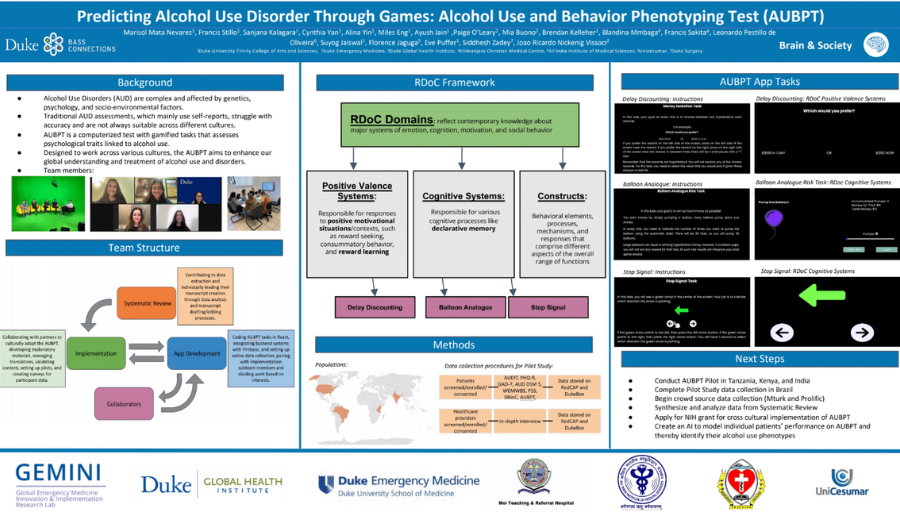Screening Alcohol Use Behavioral Phenotypes Through Games
Project Team

Team profile by the Alcohol Use Behavioral Phenotyping Test for Global Populations project team
Alcohol Use Disorder (AUD) is a global health concern affecting nearly 30 million individuals worldwide, with devastating consequences and claiming several million lives annually. This pervasive disorder not only impacts individuals but also strains healthcare systems and economies globally.
AUD arises from a complex interplay of biological and social factors. Genetic predispositions influence susceptibility, while neural circuitry alterations affect reward processing and cognitive control. Socioenvironmental factors such as poverty, isolation and unemployment exacerbate AUD risk, highlighting the need for holistic approaches to prevention and treatment.
Despite its widespread prevalence, AUD often goes undetected and untreated, leading to a cycle of harm and mortality. Addressing AUD requires comprehensive strategies that encompass prevention, intervention and treatment to mitigate its profound impact on individuals, families and societies worldwide.
The Alcohol Use Behavioral Phenotyping Test (AUBPT) research team addresses the challenge of assessing AUD amidst these widespread cultural and linguistic gaps by employing tools allowing for systematic, comprehensive, coherent study of determinants of alcohol use, rather than frequently used self-assessments that face difficulty with translation and implementation globally.

AUBPT uses the Research Domain Criteria (RDoC) model to comprehensively evaluate AUD in diverse communities, particularly focusing on low- and middle-income countries. This model encompasses the biopsychosocial components of AUD, allowing for further validation and efficacy of AUBPT in various communities.
RDoC is a tool to ensure the cultural, lingual, social and overall contextual competency of assessing AUD in our project. By examining neural circuits implicated in reward processing and cognitive control, RDoC enables the development of culturally sensitive assessments. This allows for nuanced data collection, accounting for socioenvironmental influences and transcultural variations in AUD risk and presentation, enhancing our project’s cultural competence and validity in the countries in which AUBPT is currently collecting data (India, Brazil, Kenya, Tanzania and the United States).
Our Bass Connections project operates through a structured framework comprising distinct subteams, each tasked with specialized roles crucial to the success of the larger team. The Implementation team takes the lead in adapting the AUBPT for diverse cultural contexts, managing translations and conducting pilot programs to validate its efficacy.
Concurrently, the Systematic Review team extracts and analyzes data, leading their manuscript creation through these analysis and manuscript editing/drafting processes. Complementing these efforts, the App Development team spearheads the technological backbone, coding AUBPT tasks in React, integrating backend systems with Firebase and establishing online data collection mechanisms.
Our global collaborators and partners also assist our team in setting up our study sites and carrying out our goals. This collaboration among the subteams ensures a holistic approach, blending cultural adaptation, rigorous research and technological innovation to advance the AUBPT.

Currently, our team is testing out three tasks in our AUBPT app: Stop-Signal Task, Delay Discounting Task, and Balloon Analog Response Task (BART).
The Stop Signal task assesses inhibitory control by measuring the ability to stop prepotent responses, which is often impaired in individuals with alcohol use disorders (AUDs). Delay Discounting tasks evaluate impulsive decision-making by examining how individuals discount the value of future rewards, a trait associated with AUDs due to heightened preference for immediate gratification. The Balloon Analogue Risk Task (BART) gauges risk-taking propensity by simulating real-life risk situations, offering insights into impulsivity and risk behavior tendencies commonly observed in individuals with AUDs.
We are using Standard Operating Procedures (SOPs) at each study site for data collection and content validation of the app. Our ultimate goals are to validate the AUBPT tasks for assessing AUD behaviors, adapt AUBPT to different cultural settings and test the clinical utility of AUBPT with existing mental health clinical scales across different clinical settings.
Predicting Alcohol Use Disorder Through Games: Alcohol Use and Behavior Phenotyping Test (AUBPT)
Poster by Marisol Mata Nevarez, Francis Stillo, Sanjana Kalagara, Cynthia Yan, Alina Yin, Miles Eng, Ayush Jain, Paige O'Leary, Mia Buono, Brendan Kelleher, Blandina Mmbaga, Francis Sakita, Leonardo Pestillo de Oliveira, Suyog Jaiswal, Florence Jaguga, Eve Puffer, Siddhesh Zadey and Joao Ricardo Nickenig Vissoci

